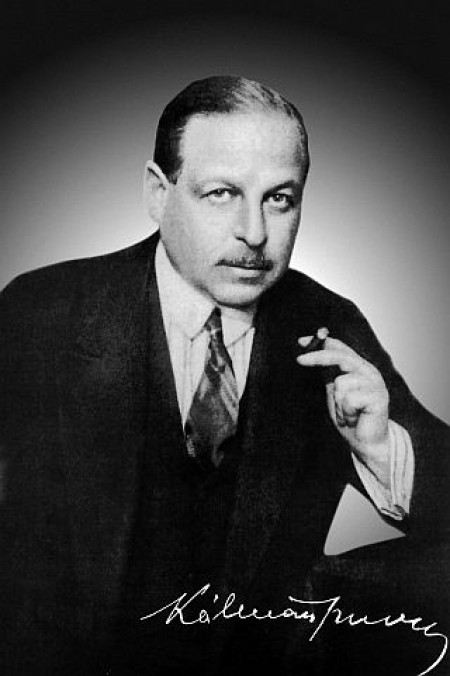
24 October 1882, Siófok – 30 October 1953, Paris
Imre Kálmán, one of the most outstanding composers of the operetta life after World War I, was a member - besides Béla Bartók, Zoltán Kodály and Leó Weiner - of probably the most famous ‘class' of the Academy of Music the composition group led by Hans Koessler.
Owing to his educated, music-loving family he had contact with music already in his childhood, and especially with the piano – by his sister's music school studies – that remained his famous instrument life-long. He also gained his first experiences of operettas there, as he was a regular visitor of the summer theater performances held at Siófok. He spent his school years with preparing for the dreamed career as a pianist in Siófok and in Budapest, but due to his worsening hand illness it turned out in his last year at high school already that he had to give up practical music-making. Against this background he applied to the composition division of the Academy of Music where he became a member of the Koessler-class - mentioned above - in 1900. Besides music he completed some semesters at the University of Law, as well. From 1904 to 1908 he was the music critic of the journal Pesti Napló (Pester Diary), during this period of time his symphonic poems titled Saturnalia and Endre és Johanna (Endre and Johanna) were premiered. He won Emperor Franz Joseph Prize for his songs in 1907 that made studies in Bayreuth, Munich and Berlin possible for him. The success of some of his humorous cabaret-songs premiered the same year, and last but not least the potential financial possibilities of them, directed his interest definitively towards popular music.
His career as an operetta composer began in 1908 with the premiere of his work titled Tatárjárás (The Autumn Maneuver) that was followed by more than a hundred performances in Budapest and provincial towns. The success of the operetta called the attention of also the impresarios in Vienna; therefore it was premiered on the stage of Theater an der Wien in the next season with the title Ein Herbstmanöver. Some years later, being a resident of Vienna already (changing his name to Emmerich Kálmán) he composed those works that made him world-renown. The operettas Die Zigeunerprimas (1912), Csárdásfürstin (1915), Gräfin Mariza (1924) and Die Zirkusprinzessin (1926) were performed around the world and still belong to the most famous works of the genre up to this day.
The success of the operettas of Imre Kálmán had and has two secrets up to now: the outstanding craftsmanship and musical literacy behind the works that is definitely due to Hans Koessler, with which he could combine the sentimentalism of the operettas of Vienna and the energy and colorful rhythm of the Hungarian popular music of his age.
Imre Kálmán fled to Paris and then to the United States at the end of the 1930s from the domination of the Nazis, where he lived and worked until the end of World War II. There he became acquainted with Arnold Schoenberg, and then by him with almost all the musicians living in exile, whom he invited to his flat in Manhattan frequently. He managed to integrate to the circulation of American musical life, his works were performed frequently on radio programs and he was awarded honorary doctorates from two universities, as well. He retained his Hungarian citizenship up to 1942.
He settled in Paris after returning to Europe in 1949, where he died soon after his seventy-first birthday on October 30, 1953.
T. K.


